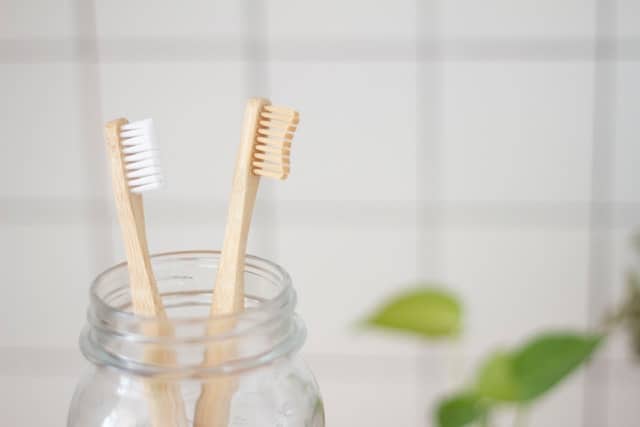Poor dental hygiene habits can lead to a vast number of oral health problems, including gum disease, cavities, tooth decay, and bad breath, to name just a few. It’s important to know the signs your oral health needs improving, but often, the first step is to improve your brushing habits.
While many people believe good oral habits include brushing twice a day with fluoride toothpaste and mouthwash, there are many common mistakes still missed out by many. However, these common mistakes are not always thought about.
In this guide, we explain the common mistakes most people make while brushing your teeth, and how to brush your teeth properly.
Brushing Too Hard
Brushing too hard can be damaging to your teeth and gums and can result in you removing the protective enamel which coats your teeth, leading to tooth sensitivity and receding gums. Most people brush too hard due to using the wrong brush. If the bristles are too stiff, they can damage your gums and cause bleeding.
Rather than using a hard-bristle toothbrush, opt for soft or extra-soft bristles for a more gentle brushing technique. After all, you are brushing to clean your teeth and dislodge stuck food particles, so you won’t need to brush too hard.
Rinsing After Brushing
When brushing your teeth, you might be tempted to finish off by rinsing the toothpaste out of your mouth. However, this can reduce the efficiency of the fluoride from your toothpaste, offering minimal protection to your teeth.
Spit the toothpaste out, use a mouthwash containing fluoride, then rinse, gargle and spit. Avoid rinsing your mouth with water after brushing your teeth and try to avoid drinking within the first 30 minutes of brushing.
Not Brushing For Long Enough
We all know that you should spend two minutes brushing your teeth, twice a day. With that being said, the average brushing time is only 45 seconds, which means that the fluoride in the toothpaste isn’t given enough time to attach to the tooth enamel.
Some electric toothbrushes provide an automatic two-minute timer to alert you after two minutes of brushing, which makes it much easier for those who often do not brush their teeth for long enough. To find an electric toothbrush that suits you, have a read of our guide on the best electric toothbrushes for 2020.
Not Flossing
If you don’t already – make a habit of flossing every day to remove the plaque between your teeth, where your toothbrush is unable to reach. Plaque, bacteria and bits of food can turn into hard calcified deposits on your teeth, which can lead to gum disease amongst other dental problems. We advise flossing once a day, every day, usually at nighttime.
Not Cleaning Your Tongue
Cleaning your tongue should be part of your daily tooth brushing regime as it removes bacteria and prevents bad breath.
You can either clean your tongue using the bristles on your toothbrush, the grooved side on the other side of your toothbrush (not all toothbrushes have this), or even better, a tongue scraper.
Not Replacing Toothbrush Regularly
Depending on your toothbrush, the average lifespan is usually around three months, which is equivalent to around 200 uses. After three months, you’ll begin to see the bristles worn out and frayed, making it less effective in cleaning your teeth.
Change your toothbrush (or toothbrush head for electric toothbrushes) every three months or when you notice the bristles losing their flexibility. Avoid using your toothbrush for any longer as bacteria and food particles can accumulate in the bristles.
Incorrect Brushing Techniques
Do you brush your teeth in back and forth motions? Well, you’ll want to think about changing up your brushing techniques. Brushing your teeth side-to-side can damage the soft tissue lining between your teeth and gums.
Instead, brush your teeth and gums in circular motions, which is more effective in cleaning the teeth, gums and gaps.
Brushing Too Often
Brushing your teeth too often can do more harm than good. Many people believe that it’s necessary to brush after every meal, although, this is quite the opposite.
Brushing more than two times a day can damage your gums and can erode the protective layer of enamel on your teeth. Instead, try to only brush your teeth twice a day in the morning (preferably before breakfast) and before you go to bed at night.
Brushing Too Soon After Eating
As mentioned above, it’s better to brush your teeth before having breakfast rather than after – contrary to popular belief. While we know it makes more sense to brush after having breakfast, this can be harmful to your protective enamel.
Brushing your teeth before having breakfast can rid the mouth of plaque build-up overnight and the fluoride in your toothpaste can then coat your enamel with a protective barrier to prevent damage from acid in your breakfast. We advise waiting at least 30 minutes to brush your teeth after having a meal.
Maintain Your Oral Health
Brushing your teeth twice a day is the best way to practice good oral hygiene and should be seen as part of your daily routine. Regular brushing with a fluoride toothpaste keeps your mouth clean and removes plaque and trapped foods that have built up throughout the day.
As well as this, you should ensure regular trips to your London dentist who can treat oral problems whilst they occur in the early stages.
If you require an emergency dentist in Victoria, contact us on 020 7233 7660. Our dentists will see all emergency patients on the same day whenever possible, and you will be offered the next available appointment as soon as you call.
- GERD and Your Teeth: Why you should see a dentist urgently - November 24, 2024
- When a broken tooth is considered a dental emergency - November 24, 2024
- How to prevent tooth decay in children - July 9, 2024



